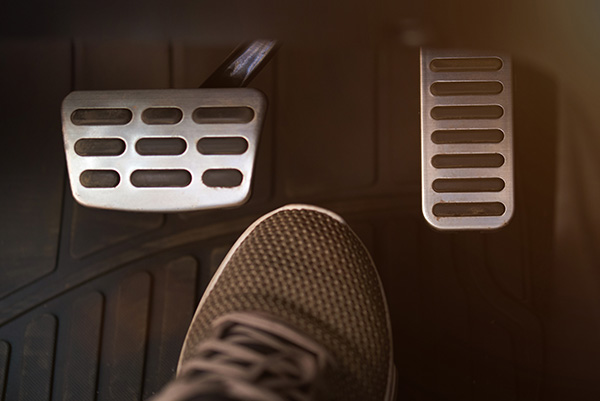
You step on your brake pedal expecting a smooth, easy response, but instead, it feels stiff, hard to press, or unresponsive. This can be both alarming and dangerous. A brake pedal that resists pressure is more than just a nuisance. It's a warning sign that something is wrong with your braking system. If left unchecked, it can lead to unsafe stopping conditions or even complete brake failure.
A firm brake pedal may seem like a sign of strength, but in most cases, it's the opposite. Let’s take a closer look at why this happens and what it might mean for your vehicle’s safety.
The Role of the Brake Booster
Most modern vehicles use a brake booster to assist with stopping power. This component sits between the brake pedal and the master cylinder, and it uses either engine vacuum or hydraulic pressure to amplify the force from your foot. Without it, stopping a 3,000-pound vehicle would take much more effort.
When the brake booster isn't working properly, you’ll feel like you’re pressing against a wall. It’s harder to generate the necessary pressure in the system, which means braking becomes much more difficult and less predictable.
Vacuum leaks, a faulty check valve, or a damaged diaphragm inside the brake booster can all cause a loss of assist. In diesel-powered or newer vehicles with electronic systems, the same problem may stem from a malfunction in the hydro-boost or electric assist units.
Vacuum Supply Issues
Since most brake boosters rely on engine vacuum to function, anything that disrupts this supply will affect braking performance. If your vehicle has a vacuum leak from a cracked hose, loose connection, or worn-out valve, it can cause a stiff pedal.
In some cases, the issue may be linked to the engine itself. If your car isn’t producing enough vacuum due to poor engine performance or modifications, the brake booster won’t have the support it needs. Turbocharged vehicles and diesels often require special solutions, such as a vacuum pump, to maintain proper brake performance.
Problems With the Master Cylinder
Another key player in the brake function is the master cylinder. This component pushes brake fluid through the lines and into each wheel when you step on the pedal. If the master cylinder is failing, it may create excessive resistance or lead to a pedal that feels inconsistent.
Internal blockages, damaged seals, or worn parts in the cylinder can change how pressure is transferred through the brake system. While the result may not always be a completely hard pedal, it often leads to inconsistent pedal feel or difficulty in building adequate pressure.
Brake Fluid Issues and Line Blockages
Brake fluid is the lifeblood of your braking system. It transfers the force of your foot into stopping power at each wheel. If the fluid is contaminated, aged, or low, it can lead to braking problems—including a hard pedal.
Sometimes the issue isn't with the fluid itself but with the lines it travels through. Debris, corrosion, or collapsed rubber brake hoses can cause restrictions that lead to a stiff or unresponsive pedal. If fluid can’t move freely through the system, your braking effort increases while effectiveness decreases.
A brake fluid flush may solve the problem if contamination or moisture buildup is involved. However, if there’s a blockage, the affected lines or hoses may need replacement.
Frozen or Seized Brake Calipers
Brake calipers are responsible for pressing the brake pads against the rotors when you apply the brakes. If one or more calipers seize or freeze, the hydraulic pressure in the system may increase abnormally. This can cause the pedal to feel harder than usual because the system is essentially jammed.
Seized calipers also often cause pulling while braking or uneven wear on the brake pads. In severe cases, the wheel may become hot to the touch after driving. These symptoms require immediate attention and caliper replacement.
Signs You Shouldn’t Ignore
A hard brake pedal is never something to overlook. Some of the most common signs that point to a deeper issue include:
- Needing both feet to stop the vehicle
- Brakes engaging only after extreme pressure
- A hissing noise from under the dash when braking
- A change in pedal feel after starting the engine
- Brakes that feel inconsistent or require pumping
If you notice any of these symptoms, it’s time to bring your car in for a detailed inspection.
European Auto Motors – Brake Inspection and Service in Doral, FL
At European Auto Motors, we diagnose and repair braking problems with precision and care. Whether your vehicle has a vacuum brake booster, hydro-boost system, or electronically assisted brakes, our team in Doral has the tools and experience to get your pedal feel back to normal.
Don’t let a hard brake pedal become a hazard—visit us today and drive with confidence.